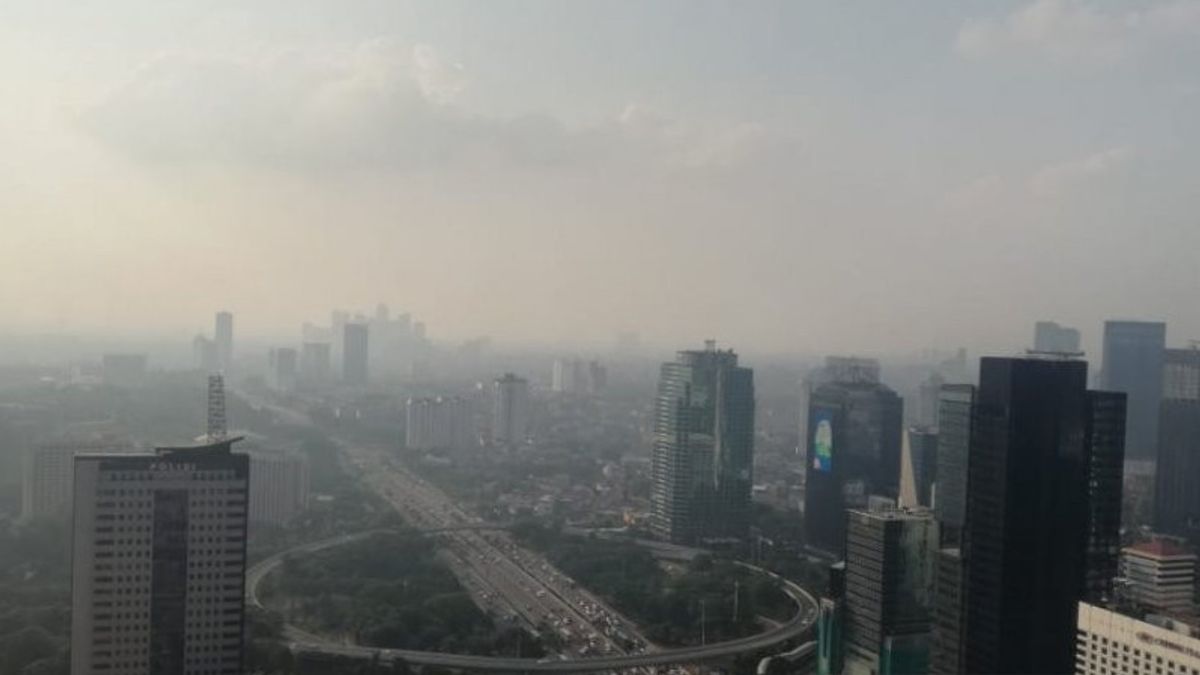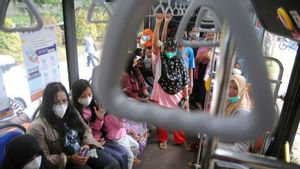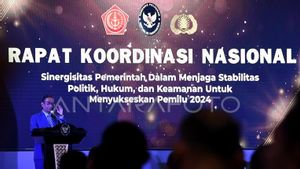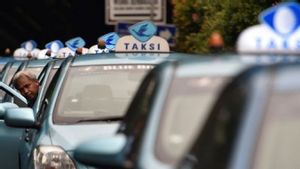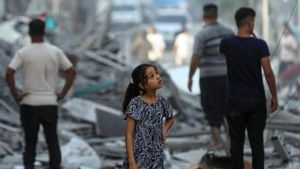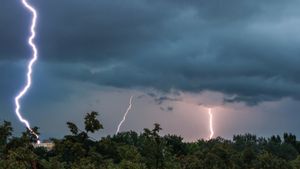JAKARTA The air quality index in DKI Jakarta has not changed significantly in the past year. Often occupies the top 10 positions as the city with the worst air quality in the world according to IQAIR data, especially in the morning.
On June 15, 2022 at 10.00 WIB, the air quality index in DKI Jakarta was included in the unhealthy category reaching 185 AQI US. Then it decreased to 165 AQI US at 12.00 WIB and continued to decline to the moderate category at 65 AQI US at 16.00 WIB.
The Meteorology, Climatology and Geophysics Agency (BMKG) also noted that since June 15, 2022, PM2.5 concentration has increased and reached its peak at the level of 148 mg/m3 (micrograms per cubic meter).
On June 6, 2023 at 09.40 WIB, conditions were not much different. Jakarta's air quality index, based on IQAir data, is at 152 with a PM2.5 concentration of 57 gung/m3. Since May 15, 2023, the air quality index in Jakarta has never been less than 100.
This means that the air quality in Jakarta is unhealthy. The number 101-200 indicates that the level of air quality can affect human or animal health with sensitive body conditions.
Meanwhile, Particulate Matter (PM2.5) is an air quality pollutant, a dust particle measuring 2.5 microns. PM2.5 sources, according to IQAir, are very diverse, usually from motor vehicle fuel smoke, power generation smoke, industrial processes, and cigarettes.
Naturally, PM2.5 can also come from dust, jelaga, dirt, inflated salt, plant sporam, and filter powder. However, the dominant PM2.5 sources can vary depending on seasons, weather, and climate.
This is not a trivial problem because PM2.5 is considered the deadliest air particle for humans because it is very easy to enter the respiratory system. It is not filtered by the upper respiratory system and directly attaches to the pulmonary bubble, so it can reduce the lung's ability in gas exchange.
Making humans susceptible to respiratory disease, asthma, heart disease, trigger death. A number of studies, according to AQAIR, have also confirmed that many serious health complications are caused by PM2.5 exposure.
Among other things, a study in 2011 published in The American Journal of Respiratory Critical Care Medicine. Shows that every 10 micrograms per cubic meter increase PM2.5 concentration affects an increase in lung cancer by around 15-27 percent.
Then, research written by Karn Vohra from University College, London, published in Science Advances in April 2022. Research shows air pollution is responsible for 180,000 excess deaths in tropical cities in the world, including Jakarta, in 2018.
Residents actually had time to sue for this condition and managed to win it. The Central Jakarta District Court in September 2021 stated that the central and regional governments must take a number of steps to improve air quality in Jakarta.
另请阅读:
Kompas Daily wrote, according to the court's decision, the President was asked to establish a national ambient air quality standard that is sufficient to protect human health, the environment, and ecosystems, including sensitive population health based on the development of science and technology.
Meanwhile, the Minister of Environment and Forestry was sentenced to supervise the Governor of DKI Jakarta, the Governor of Banten, and the Governor of West Java in an inventory of cross-border emissions for the three provinces.
DKI Jakarta Governor Anies Baswedan stated that he accepted the decision and did not file an appeal (Kompas.id, September 16, 2021).
However, said Greenpeace Indonesia Campaigner Bondan Andriyanu, the President of the Republic of Indonesia and the Ministry of Environment and Forestry instead filed an appeal after their appeal was rejected by the high court in November 2022.
"It indicates the government's arrogance and neglect of the people's right to clean air," he said.
Overcoming air quality, Greenpeace Indonesia advises the government to further strengthen public transportation so that people using private vehicles switch to urban transportation. Also provide incentives for those who use environmentally friendly vehicles.
According to a report from the Central Statistics Agency, the number of motorized vehicles in the capital city in 2022 will increase to 26.37 million units. Most are motorcycles with 17.3 million units. Then, passenger cars were 3.76 million units, trucks were 748.39 thousand units, and buses were 37.18 thousand.
In addition to transportation, it is also necessary to transition energy from coal to clean energy. Because, based on a Vital Strategies study, coal burning is one of the causes of poor air quality in Jakarta. Nearly a fifth of the pollution comes from burning coal.
"Jakarta is narrowed by 8 coal power plants within a radius of 100 km. In 2020, the Center for Research on Energy and Clean Air (CREA) research institute noted that Jakarta is also surrounded by 118 industrial facilities that contribute to air pollution in Jakarta," Greenpeace wrote.
Another step, literation activists on the walkbook.org Hanif Sofyan also suggested increasing connector parks, a shady space in the city. This is part of the Green Open Space (RTH). Apart from damping noise pollution, the connector parks are also the controller of urban development. Immitizing climate change mitigation, especially the increasingly stronger pollution.
"RTH for the city is the lungs of the city. The more green open space, the more green open space, the more it will support a healthy city or Green City. We have to think about how climate change will impact the future of our urban spatial planning," he wrote in Kompas.com column on June 7, 2023.
China can be an example. According to a study based on satellite measurement published by the Energy Policy Institute (EPIC) from the University of Chicago, China managed to reduce to 40 percent the number of air particles in just seven years from 2013-2020.
The first step that has been taken is to prohibit the construction of coal-fueled power plants in almost all areas polluted by air pollution, and to force existing power plants to reduce emissions or switch to natural gas fuels. To offset decarbonization, the Chinese government has added power plants from renewable energy.
The BBC also actively promotes nuclear energy: between 2016 and 2020 China has doubled its nuclear energy capacity, to 47 GW with 20 new plants.
The second step is to fix transportation. In Beijing, Shanghai, Guangzhou and other major cities, the number of mobile cars in circulation is limited to daily quotas and the number of new number plates is limited every year.
Although the air quality index has not yet entered the safe category, the University of Chicago estimates that the decline in pollutant particles has a positive impact on the quality of life of the Chinese people. In fact, it is estimated that the population will live an average of 4.4 years longer than in 2013.
The English, Chinese, Japanese, Arabic, and French versions are automatically generated by the AI. So there may still be inaccuracies in translating, please always see Indonesian as our main language. (system supported by DigitalSiber.id)
